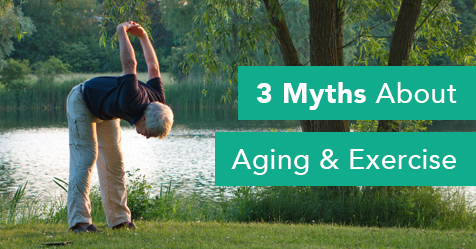 By Koratrona Evans, DPT, OSC Resident, Drayer Physical Therapy, Carlisle Center
By Koratrona Evans, DPT, OSC Resident, Drayer Physical Therapy, Carlisle Center
One in four Americans ages 50 or older is physically inactive on a regular basis. People live sedentary lifestyles for a variety of reasons, some of which have little or no basis in fact.
Here are three common myths about exercise and the elderly and the actual benefits of physical activity to that population.
Myth #1: As you age, you don’t have enough energy to exercise
Reality: The more active you are, the better your activity tolerance is and the more you can do throughout the day. The less active you are, the lower your activity tolerance. A University of Georgia study found a 65 percent decrease in fatigue levels in subjects who performed 20 minutes of exercise three times a week for six weeks.
Research shows that participation in sports and exercise has a positive effect on overall physical activity and energy levels. Staying active can lower your resting heart rate, improve your blood pressure, and even increase your metabolic rate. Exercise increases blood flow in the body, delivering more nutrients and oxygen to muscles and improving energy production.
Myth #2: Seniors are too old to exercise
Reality: Fauja Singh is the world’s oldest marathon runner, who finished his last race in 2013 at 101 years old. He has proven that age is nothing but a number and that number does not determine your ability to partake in exercise. Forty-nine percent of runners who completed a U.S. marathon in 2015 fell into the “masters” classification of 40 years of age and older.
A randomized control trial analyzed the effects of home exercise programs in 200 subjects ages 60 or older. Improvements in balance, lower quarter strength and disability ratings were measured after the program. No adverse health effects were noted with any of the participants.
Myth #3: The elderly population could easily get injured while exercising
Reality: If exercise is performed and progressed correctly, there is lower injury risk with physical activity for all ages. People of all age groups are at some risk when performing strenuous activities. It is important that we eliminate the stereotype that as people age they get progressively weak and frail.
Many exercise-related injuries are preventable. Some common injuries while working out include muscle strains and tendonitis. These injury risks can be reduced with a proper warm up, stretching and slowly progressing the intensity and frequencies of workout sessions.
Exercise benefits people of all ages. And that’s the truth.
References
Bylina, M. M., Hu, T. C., Conway, T. J., Perrin, J., Eldridge, H. J., Hurst, J., & Cox, C. C. (2006). Comparison of exercise attitudes and behaviors of urban older adults with AARP’s national sample results. Journal of aging and physical activity, 14(1), 41-58.
Jette A, Lachman M, Krebs D, et al. Exercise — it’s never too late: the Strong-for Life program. American Journal Of Public Health [serial online]. January 1999;89(1):66-72. Available from: CINAHL Plus with Full Text, Ipswich, MA. Accessed April 24, 2017.
Puetz T, Flowers S, O’Connor P. A randomized controlled trial of the effect of aerobic exercise training on feelings of energy and fatigue in sedentary young adults with persistent fatigue. Psychotherapy & Psychosomatics [serial online]. March 2008;77(3):167-174. Available from: CINAHL Plus with Full Text, Ipswich, MA. Accessed April 23, 2017.
Running USA. (2016, May 25). Retrieved April 232, 2017, from http://www.runningusa.org/marathon-report-2016?returnTo=main
Yamada Y, Noriyasu R, Kimura M, et al. Association between lifestyle and physical activity level in the elderly: a study using doubly labeled water and simplified physical activity record. European Journal Of Applied Physiology [serial online]. October 2013;113(10):2461-2471. Available from: MEDLINE Complete, Ipswich, MA. Accessed April 24, 2017.
